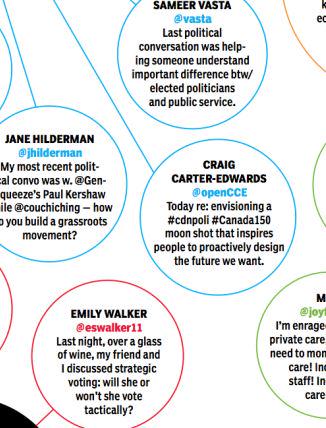
Here's the Post headline:
Here's the quote, in full:
Folk are having a field day with this, mockingly referring to "Care Bare Economics" and calling this Trudeau's campaign-sinking flub.
All that's spin, of course - his opponents and detractors are always on the look out for the campaign-sinking line; the detractors of each leader and party are doing the same. Hence the focus on Mulcair's eyes, or Harper's lack of personality; these are sound-bite simple things that ads can be based on.
Being politics, the emphasis is always on tearing down your opponents, not trying to understand what they mean, only what they're trying to convey.
I'm going to ask the question because I think it's an incredibly relevant one:
What does economy from the heart outwards" actually mean?
It actually surprises me that the spin class can't figure this one out all on their ownsome. Really, they should be the first to glean the substance of the phrase.
So let's make this relatable for them.

Do attack ads work? Of course they do - that's why partisans use them. The gurus of spin and emotion-based advertising get that people think with their head but act with their heart - their emotions.
We may not
like attack ads, because they are intellectually offensive to us, but they work because they play on our emotions,
going over the heads of our conscious, contemplative selves.
Put it simply - it doesn't matter how much the party spokespeople try to portray themselves and their leaders as logical, evidence-based communicators; the substance of their presentation is emotional, not factual.
The Kory Teneyckes of the world may put down Trudeau and his "Care Bear economics", but they're just as invested in emotionally-driven messaging and planning as anyone else.
People think with their brains, but act with their hearts. Their actions are driven by emotion first, logic second. It's basic behavioural economics.
Which is what Care Bare economics is; a cutesy way of referring to growing field of study that is reshaping the way we view everything from voting behaviour to innovation to motivating productivity.
Stephen Harper is an economist. He's studied economic theory; he gets the math of economics. That should make him an excellent economic manager, right? Able to predict trends through simple calculations?
Yet like so many economists, he's gotten more wrong that he has right. He has not managed to steer the country away from our latest recession and in fact, when you look at his positions on everything from cutting childcare cheques to stifling pension supports, he's piling on our socio-economic structural deficits.
How can this be?
It's because Harper doesn't get people; he doesn't get behaviour. He's thinking about numbers, about markets and banks and purchasing power - not about human motivation. That's not something he knows how to do.
Harper wanted to be leader because he wanted the country to look the way he wanted it to. To him, being the leader equates with
being the boss - when he's in charge, he calls the shots, full stop.
Yet look at his litany of failures. The US didn't tow his line on Keystone. The provinces have essentially ignored his anti-national health care stance and are going it alone. The Supreme Court has knocked down legislation as unconstitutional, his attempts at burying the Duffy Affair - one of his own making - have failed; the list goes on, and on, and on.
And on.
Why?
Two reasons. The first is the easiest: Harper doesn't get people. He doesn't know how to inspire, because he can't emotionally relate to what drives people to act. There's a diagnosis in this, but the bottom line is that Harper uses the emotional equivalent of a sledge hammer (fear) because it's really the only tool in his motivational box.
Not everyone is afraid of him, especially when it comes to international partners. Harper likes to be the smartest, most unchallenged person in the room, and that doesn't happen on the global stage. He fails at achieving his goals.
Some people are more committed to what they do than they are to themselves, something else Harper doesn't get; so when staff go rogue or stakeholders he can completely undermine stand against him, he can only see these actions through the lens of "why don't they get it?"
Harper consistently fails to understand the behavioural consequences to his actions and, as a result, walks into one political rake after the other, from Prorogation to pension reform to corrupt Senators.
The second reason spins off of the first; because Harper doesn't get people and doesn't get motivation, his starting point is way off the mark. His "vision" of Canada is of a static, neo-con box that he wants to stuff all of Canada into. It's a completely unachievable goal that will never happen, because people aren't all the same; the world is more complex than the Platonic Cave of Harper's dream Canada.
Stephen Harper is a great tactician, but he sucks at complexity theory. He understands numbers, but he is clueless about people.
This is why he consistently falls short of his objectives.
Back to Trudeau.
From all indications, Trudeau is no less an egoist than anyone who runs for high office; from words he chooses to some of the positions and messaging he approves, he's not directly in line with the average Canadian either.
One thing that's emerging about Trudeau as the campaign gets underway, though, is something we kinda knew already.
To sum it up with an analogy;
If you're in a fist-fight, the objective is never to hit your opponent; it's to punch clear through them.
If you're giving a concert, or teaching a class, or delivering a speech, the goal is never to project to your audience - it's to captivate them, own them.
This is a thing that Trudeau gets, regardless of whether his execution leaves something to be desired or not.
His debate close is evidence of this. Many people who don't like him didn't like it, but many people who are neutral about him were moved by his words, and that was the whole point.
The goal of leadership isn't to force people into your box, as Harper has consistently tried and failed to do; the purpose of leadership is to inspire people to be full partners in the realization of a vision that everyone relates to, but you have taken it upon yourself to articulate.
When people put themselves first, collective action is short-sighted. Tragedy of the commons scenarios ensue:
- people rush the yellow light to get ahead and slow down all traffic by crowding intersections
- Senators will take whatever they can get, because they can, without consideration to the broader consequences for their teams
- employees will do the bear minimum and offer no insight, because that's all that's on offer
When people believe in something, they can be more than the sum of their short-term interests; they can be a community.
This concept of communal drive and inspired action is referenced heavily in modern business classes, at economic forums like the Toronto Global Forum and is a core principle of incubation spaces, social innovation leaders like CSI and any good User Generated Content campaign on social media.
Government policy is increasingly moving in the crowd-source direction. Millenials are motivated at least as much by what they can contribute, when inspired, as what they can take away, carrot-and-stick style.
His wording might not be perfect, but Trudeau's general perception of Care Bear Economics is in tune with broader societal trends as we shift from the 20th Century Industrial economy to the 21st Century social capitalism.
Which of course means nothing in the heat of an election campaign. If you can't explain all of this in a bumper-sticker sized quote and a hashtag, you're wasting your time.
Big picture, though, it doesn't matter.
Whether led by Trudeau or, as is more likely, led by a coalition of grassroots activists, virtuously scheming public servants and heart-based leaders from the corporate world, Care Bear Economics is on the rise, and that's a good thing.
It's a generational thing; if you don't get it, don't panic. I guarantee your grandchildren will.





 Jane Hilderman
Jane Hilderman 

 Justin Trudeau
Justin Trudeau 